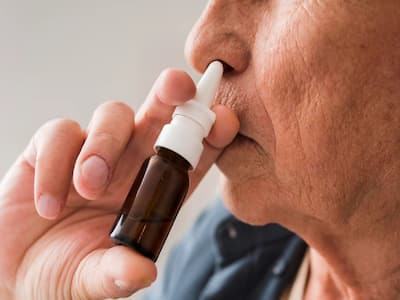Don’t Miss Out on the Latest Updates.
Subscribe to Our Newsletter Today!
Why Do We Need Nasal COVID-19 Vaccine?

Bharat Biotech has completed phase III trials for its intranasal COVID-19 vaccine candidate, called BBV154. It's likely to receive regulatory licenses this month.
Mass vaccination against COVID-19 is underway across the globe to overcome the ongoing pandemic. As the novel coronavirus continued to spread its tentacles around the world, researchers, vaccine makers and governments were in a race to develop a vaccine against the contagious virus. On August 11, 2020, Russia launched 'Sputnik V', which was touted as the world's first COVID-19 vaccine. A few days later, the U.S. Food and Drug Administration approved the Pfizer-BioNTech COVID-19 Vaccine. India rolled out its COVID-19 vaccination drive on 16 January 2021, using AstraZeneca-Oxford University's Covishield and Bharat Biotech's Covaxin. So far, the World Health Organisation (WHO) has approved eleven COVID-19 Vaccines for emergency use, while approval for many others is pending. Meanwhile, a global race is on to develop Covid-19 intranasal vaccines.
Numerous research projects have started to develop nasal vaccines for Covid-19, but most of them are still in the preclinical stage or early clinical trials.
COVID-19 nasal vaccines
The University Hospital of Munich is developing a Covid-19 nasal vaccine similar to the existing flu vaccines for children. The research project is being funded the German government, which is allocating about 1.7 million euros for the research project.
Also Read
- Indian COVID-19 Vaccine, Corbevax, Gets Emergency Use Authorisation From WHO: Know All About This COVID Vaccine
- New COVID Vaccine Gets FDA Nod Amid Sudden Surge In Cases: Who Is Eligible For The Shot And Other Details
- Baby's Dark-Brown Eyes Turn Blue After Covid-19 Treatment With Favipiravir: Here's Why
Speaking to the media persons, the country's Minister of Education and Research Bettina Stark-Watzinger said that the vaccine will be directly applied to the nasal mucosa, where the virus enters the body, using a spray.
Bharat Biotech is expecting to receive regulatory licenses for its intranasal COVID-19 vaccine candidate, called BBV154, this month. The clinical phase III trials of the vaccine have been completed and the data will be submitted to the Drugs Controller General of India (DCGI) soon.
The DCGI had granted permission to the company to conduct clinical trials for intranasal vaccine as booster dose, as well as to conduct a trial separately to compare the immunogenecity and safety of BBV154 with Covaxin.
The company said that the intranasal vaccine provides immune protection right at the site of infection (in the nasal mucosa, which is essential for blocking infection as well as transmission of the virus.
In The US, the National Institute of Allergy and Infectious Diseases, is funding research on nasal COVID-19 vaccines that are mostly likely to be used as a booster dose.
Akiko Iwasaki, an immunologist at Yale University, and her team are also working on two such vaccines: one is a protein-based nasal spray, the other is an mRNA vaccine that would be administered into the nose using nanoparticles.
Using a nasal vaccine as a booster dose would help strengthen the existing immunity created through previous vaccinations, and this strategy is called "prime and spike," according to Iwasaki.
Advantages of nasal vaccine over injectable
- Nasal vaccines stimulate mucosal immunity, and tackles the virus right from where it enters the body.
- Since the vaccine is administered without a needle, it's painless.
- Nasal vaccine can be easily administered without the need for trained health care workers.
- Painless means more patients would come up to receive the vaccine.
- It eliminates needle-associated risks such as injuries and infections.
- Pain-free makes vaccinating children against the disease become easier.
- It allows large scale manufacturing, which would help meet global demand.
Justifying the need for nasal COVID-19 vaccine, Dr. Krishna Ella, Chairman and Managing Director of Bharat Biotech, said that it gives protection to the whole body. According to him, injectable vaccines can only protect the lower level of the body. This is the reasons why sometimes people who were vaccinated with injectable vaccines test positive for the virus on RT-PCR.
Dr Ella added that people would rather get the nasal vaccine over the injectable one as it is easy to plug in quickly and move fast.
If everything goes well, it will be the world's first clinically proven nasal COVID-19 vaccine, the Chairman had earlier said.


